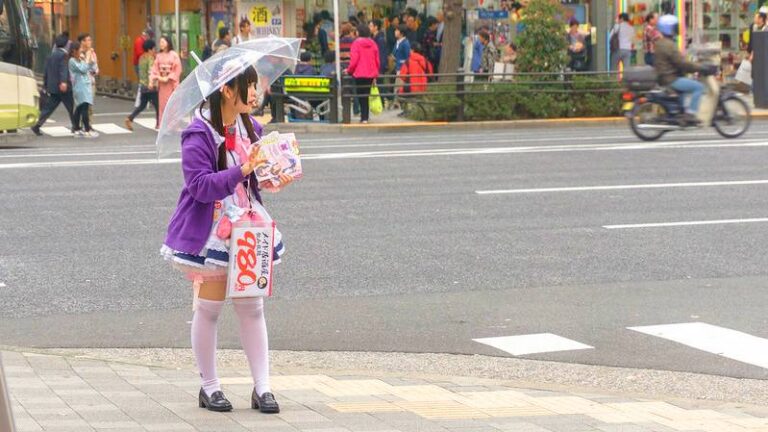The Maid Cafés in Japan
Maid Cafés in Japan, a fascinating blend of cuteness, culture, and a touch of the surreal! These unique establishments, born in the heart of Tokyo’s Akihabara district, have become a cultural phenomenon, offering an experience that’s as much about the ambiance and interaction as it is about the food and drink. Let’s embark on a whimsical journey through the world of Maid Cafés, where the concept of service is elevated to an art form, and every customer is treated like a master returning home to their castle.

The Birth of a Cultural Icon
Maid Cafés first sprang up in the early 2000s, riding the wave of Japan’s “otaku” culture – a term used to describe people with obsessive interests, particularly in anime and manga. Akihabara, known as the electric town and the otaku capital, provided the perfect setting for these quirky establishments. The concept quickly caught fire, offering a fantasy setting where patrons could step into a world straight out of a manga or anime.
The Maid Café Experience: A Blend of Fantasy and Reality
Upon entering a Maid Café, you’re not just stepping into a restaurant; you’re entering a different realm. The maids, dressed in frilly, Victorian-style maid uniforms, greet customers with a cheerful “Welcome home, Master (or Mistress)!” It’s a form of escapism, a playful nod to a fantasy world where every customer is treated as the lord or lady of a grand household.
The Atmosphere
The décor of a Maid Café often resembles a cute, fantasy version of a European home. Pastel colors, plush furnishings, and cutesy accessories set the stage. The maids perform various tasks, from serving food and drinks to engaging in light conversation and playing games with patrons.
The Menu
Expect a menu filled with whimsically decorated dishes and drinks – think heart-shaped omelets, smiling faces drawn in ketchup, and adorable latte art. The food is usually simple cafe fare, but the presentation is where the magic lies.
Interactive Experiences
Maid Cafés are famous for their interactive experiences. Maids may perform songs and dances, engage in light-hearted games, or even draw cute illustrations on your food. It’s a blend of dining and entertainment, a concept that has struck a chord with both locals and tourists.
The Cultural Significance
Maid Cafés in Japan represent a unique facet of contemporary Japanese culture, blending traditional hospitality with modern pop culture. They offer a glimpse into the playful, fantasy-driven aspects of Japanese entertainment, a stark contrast to the country’s otherwise formal and reserved societal norms.
Maid Cafés for the Global Traveler
For travelers from the US, visiting a Maid Café can be a delightful, albeit slightly surreal experience. It’s a chance to immerse oneself in a distinctly Japanese form of pop culture. Don’t worry about language barriers; many Maid Cafés are used to foreign visitors and have English menus or staff who speak some English.
Etiquette and Tips
When visiting a Maid Café in Japan, there are a few etiquette tips to keep in mind:
Photography rules: Ask before taking photos, as some cafés have specific rules about photography.
Interaction: Engage politely with the maids. Remember, it’s a wholesome, family-friendly environment.
Enjoy the fantasy, but respect the reality: The maids are performers; appreciate the character without blurring the lines of fiction and reality.
Beyond Akihabara
While Akihabara is the heartland of Maid Cafés, their popularity has seen them spread to other parts of Tokyo and beyond, even reaching shores overseas. However, the authentic experience still resides in the electric town of Akihabara.
Maid Cafés in Japan are more than just a dining experience; they are a window into the playful, imaginative side of Japanese culture. For the traveler seeking something out of the ordinary, a visit to a Maid Café offers a taste of Japan’s contemporary pop culture in an engaging, memorable way. So, when in Japan, why not embrace the whimsy and hear that cheerful “Welcome home, Master!” for yourself?



